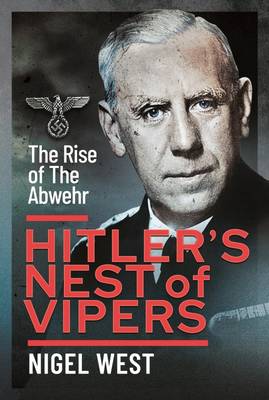
- Retrait gratuit dans votre magasin Club
- 7.000.000 titres dans notre catalogue
- Payer en toute sécurité
- Toujours un magasin près de chez vous
- Retrait gratuit dans votre magasin Club
- 7.000.000 titres dans notre catalogue
- Payer en toute sécurité
- Toujours un magasin près de chez vous
Description
"...presents an excellent and concise narrative of the Abwehr's global intelligence network. West draws from hundreds of firsthand debriefing and summary reports including disclosed sources not previously available to scholars."--American Intelligence Journal
Modern historians have consistently condemned the Abwehr, Germany's military intelligence service, and its SS equivalent, the Sicherheitsdienst (SD), as incompetent and even corrupt organizations. However, newly declassified MI5, CIA and US Counterintelligence Corps files shed a very different light on the structure, control and capabilities of the German intelligence machine in Europe, South America, the Mediterranean and the Middle East.
It is usually stated that, under Admiral Canaris, the Abwehr neglected its main functions, its attention being focused more on trying to bring down Hitler. Yet Canaris greatly expanded the Abwehr from 150 personnel into a vast world-wide organization which achieved many notable successes against the Allies. Equally, the SD's tentacles spread across the Occupied territories as the German forces invaded country after country across Europe.
In this in-depth study of the Abwehr's rise to power, 1935 to 1943, its activities in Russia, the Baltic States, Ukraine, Japan, China, Manchuko and Mongolia are examined, as well as those in Thailand, French Indo-China, the Dutch East Indies, the Philippines, Iran, Turkey, Afghanistan, and the Arab nations. In this period, the Abwehr built a complex network of individual agents with transmitters operating from commercial, diplomatic and consular premises. Before, and in the early stages of the war, it later became apparent, the Abwehr was controlling a number of agents in Britain. Indeed, it was only after the war that the scale of the Abwehr's activities became known, the organization having of around 20,000 members.
For the first time, the Abwehr's development and the true extent of its operations have been laid bare, through official files and even of restored documents previously redacted. The long list of operations and activities of the Abwehr around the world includes the efforts of an agent in the USA who was arrested after a bizarre attempt to obtain a quantity of blank American passports by impersonating a senior State Department official, Edward Weston, an Under-Secretary of State. Also, former U.S. Marine, Kurt Jahnke, who was recruited to collect information about the American munitions production and send it on to Germany. These are just two of the numerous and absorbing accounts in this all-embracing study.
Modern historians have consistently condemned the Abwehr, Germany's military intelligence service, and its SS equivalent, the Sicherheitsdienst (SD), as incompetent and even corrupt organizations. However, newly declassified MI5, CIA and US Counterintelligence Corps files shed a very different light on the structure, control and capabilities of the German intelligence machine in Europe, South America, the Mediterranean and the Middle East.
It is usually stated that, under Admiral Canaris, the Abwehr neglected its main functions, its attention being focused more on trying to bring down Hitler. Yet Canaris greatly expanded the Abwehr from 150 personnel into a vast world-wide organization which achieved many notable successes against the Allies. Equally, the SD's tentacles spread across the Occupied territories as the German forces invaded country after country across Europe.
In this in-depth study of the Abwehr's rise to power, 1935 to 1943, its activities in Russia, the Baltic States, Ukraine, Japan, China, Manchuko and Mongolia are examined, as well as those in Thailand, French Indo-China, the Dutch East Indies, the Philippines, Iran, Turkey, Afghanistan, and the Arab nations. In this period, the Abwehr built a complex network of individual agents with transmitters operating from commercial, diplomatic and consular premises. Before, and in the early stages of the war, it later became apparent, the Abwehr was controlling a number of agents in Britain. Indeed, it was only after the war that the scale of the Abwehr's activities became known, the organization having of around 20,000 members.
For the first time, the Abwehr's development and the true extent of its operations have been laid bare, through official files and even of restored documents previously redacted. The long list of operations and activities of the Abwehr around the world includes the efforts of an agent in the USA who was arrested after a bizarre attempt to obtain a quantity of blank American passports by impersonating a senior State Department official, Edward Weston, an Under-Secretary of State. Also, former U.S. Marine, Kurt Jahnke, who was recruited to collect information about the American munitions production and send it on to Germany. These are just two of the numerous and absorbing accounts in this all-embracing study.
Spécifications
Parties prenantes
- Auteur(s) :
- Editeur:
Contenu
- Nombre de pages :
- 376
- Langue:
- Anglais
Caractéristiques
- EAN:
- 9781399086370
- Date de parution :
- 21-10-22
- Format:
- Livre relié
- Format numérique:
- Genaaid
- Dimensions :
- 162 mm x 238 mm
- Poids :
- 639 g







